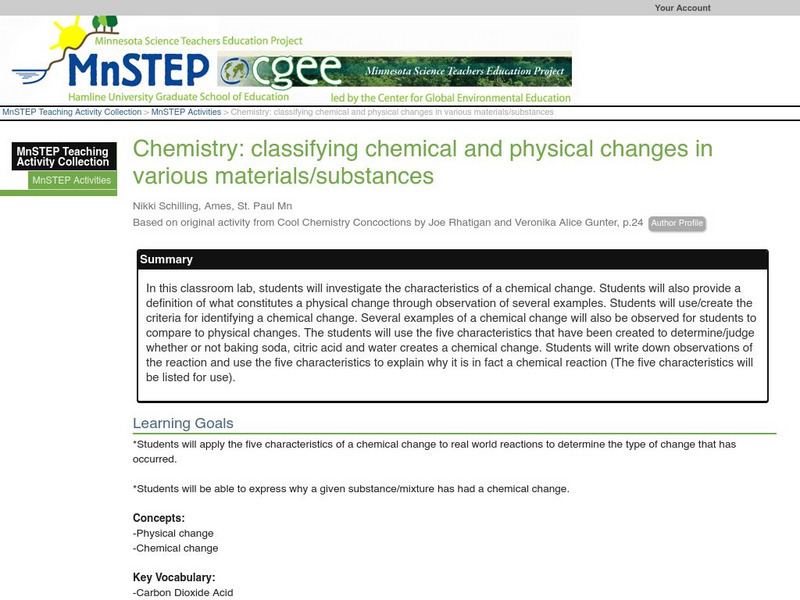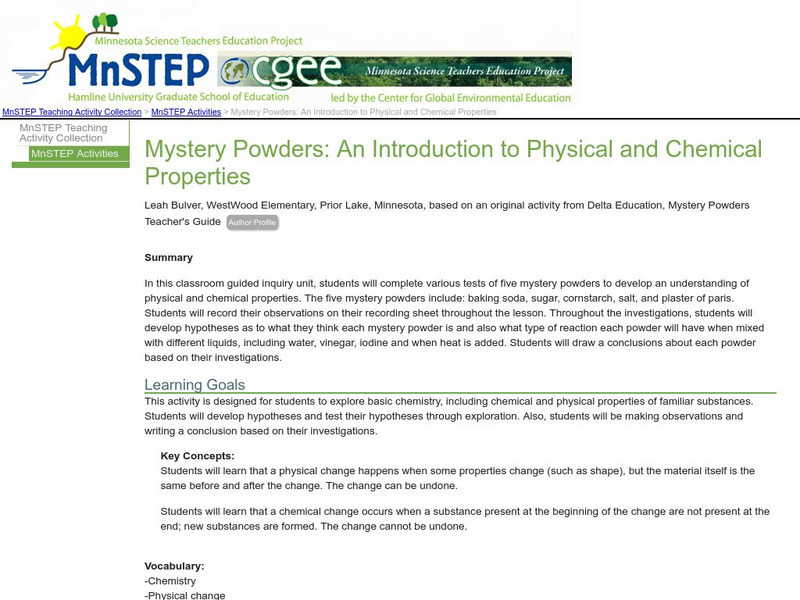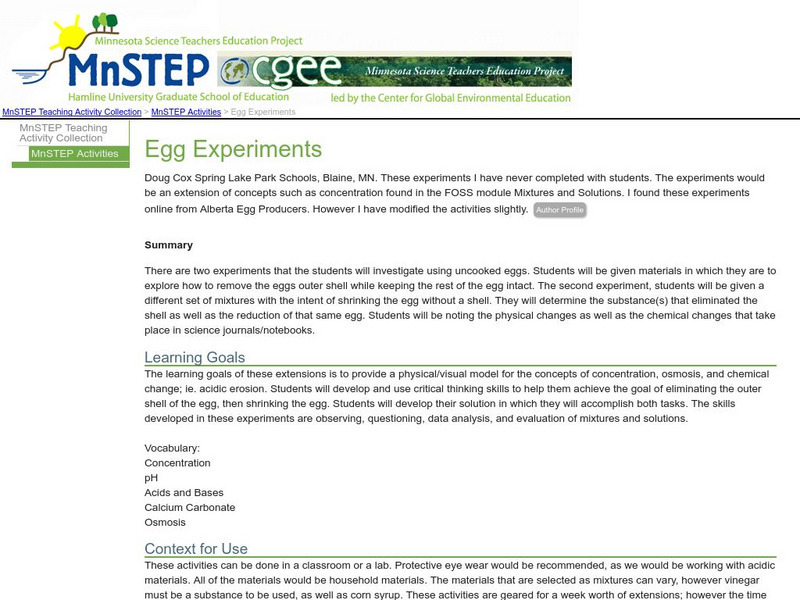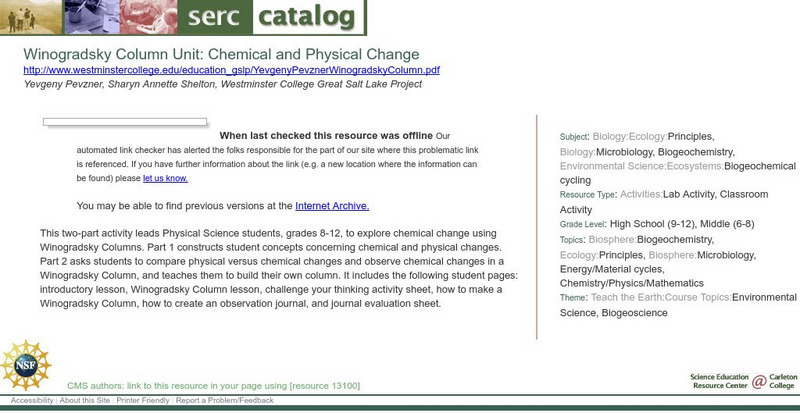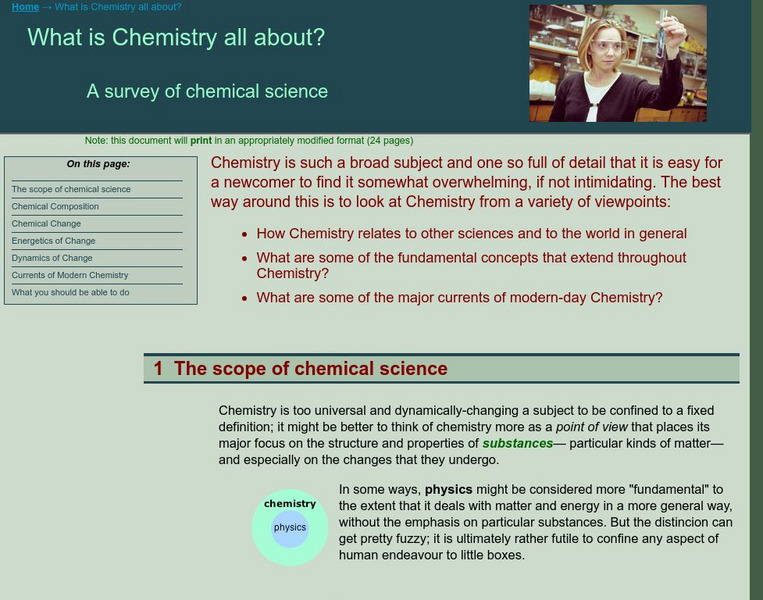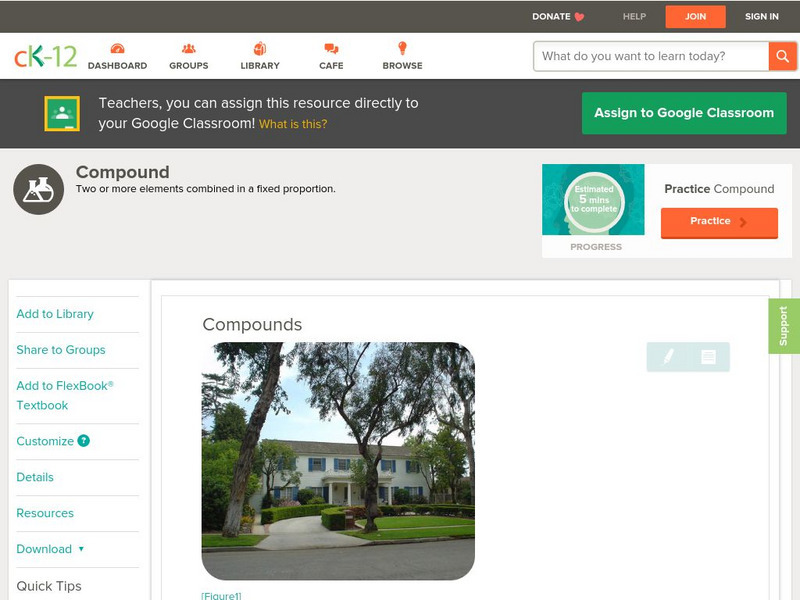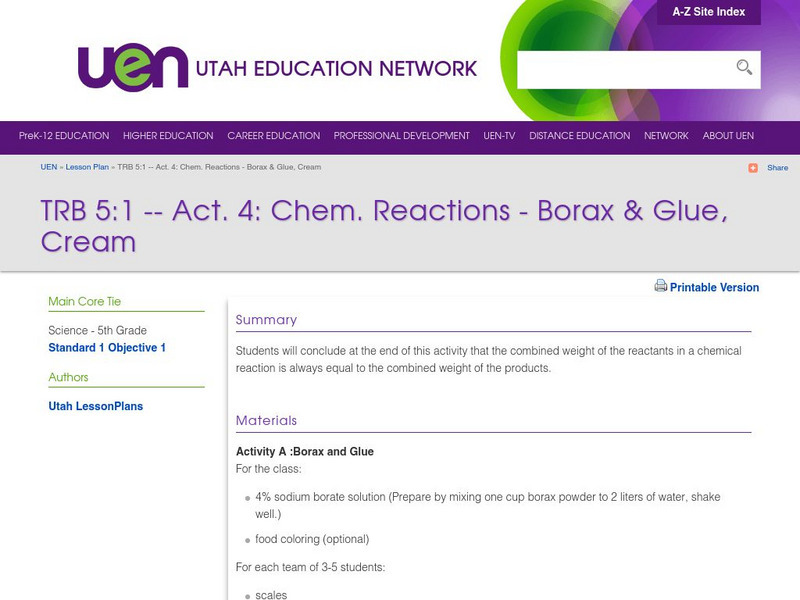Concord Consortium
Concord Consortium: Stem Resources: Baggie Chemistry
Observe chemical and physical changes with this lab using everyday household items. Lab includes procedure and online data collection tool where answers can be saved and graded by teacher.
Science Education Resource Center at Carleton College
Serc: Combustion or Oxidation
Students burn a magnesium strip to reinforce the concepts of chemical vs. physical changes, reaction types, conservation of mass, formulas and equations, stoichiometry, Lewis structures, and to explore the concept of oxidation/reduction...
Science Education Resource Center at Carleton College
Serc: Classifying Chemical and Physical Changes in Various Materials/substances
In this classroom lab, students will investigate the characteristics of a chemical change. Students will also provide a definition of what constitutes a physical change through observation of several examples. Students will use/create...
Science Education Resource Center at Carleton College
Serc: Mystery Powders: An Introduction to Physical and Chemical Properties
Students will complete various tests of five mystery powders to develop an understanding of physical and chemical properties. They will record their observations and develop hypotheses as to what they think each mystery powder is and...
Science Education Resource Center at Carleton College
Serc: Chemical Changes: Reacting an Acid and Base
In this chemistry lab, students will investigate chemical changes that occur when acids and bases react. It is meant to introduce the concepts of chemical changes, gases have mass, conservation of mass, and balancing equations. Students...
Science Education Resource Center at Carleton College
Serc: Chemical Changes and Healthy Bodies All From Snot!
In this demonstration, students observe the properties of "snot"; determine any changes within the "snot"; record and discuss their findings. This demonstration is done within a unit on the respiratory system. It leads to lively...
Science Education Resource Center at Carleton College
Serc: Egg Experiments
Two experiments where students investigate with uncooked eggs. In the first investigation, they explore how to remove the eggs outer shell while keeping the rest of the egg intact. In the second, students attempt to shrink the egg...
Science Education Resource Center at Carleton College
Serc: Winogradsky Column Unit: Chemical and Physical Change
This two-part lesson explores chemical change using Winogradsky Columns. Part 1 constructs student concepts concerning chemical and physical changes. Part 2 asks students to compare physical versus chemical changes and observe chemical...
Royal Society of Chemistry
Royal Society of Chemistry: Kitchen Chemistry: Video Clips
Sixteen program clips of various kitchen chemistry topics. See chefs at work carrying out edible chemistry experiments.
Simon Fraser University
Chem1 Virtual Textbook: Dynamics of Chemical Change
Dynamics of chemical change is a section of a larger overview on Chemistry, which covers a variety of aspects. This particular section focuses on kinetics and mechanism, kinetics, and catalysts. Examples, formulas, and pictures are...
Royal Society of Chemistry
Royal Society of Chemistry: Learn Chemistry: Resources for Students
Search from over two thousand chemistry resources for students. Options allow user to refine search to pinpoint the exact resource needed. Includes presentations, videos, worksheets, quizzes, experiments, games, tutorials, and more.
Royal Society of Chemistry
Royal Soc. Of Chemistry: Kitchen Chemistry: Chemical Changes During Cooking [Pdf]
Article, with embedded questions, describes the chemical changes that take place when meat is cooked when sugar is heated, and when fruits brown.
Royal Society of Chemistry
Royal Society of Chemistry: Kitchen Chemistry
A scientific approach to kitchen skills takes a look at the chemistry involved in preparing the food we eat.
Crescent Public Schools
The Internet Science Room: Stoichiometry
This chemistry tutorial presents Stoichiometry to students with explicit steps for solving a mass-mass problem and for solving a limiting reactant problem.
Simon Fraser University
Chem1 Virtual Textbook: Chemical Kinetics and Dynamics
Understand the rates and mechanisms of chemical change. These topics stand in contrast to the subjects of equilibrium and thermodynamics that control the direction of chemical change.
TED Talks
Ted: Ted Ed: How to Unboil an Egg
It's so obvious that it's practically proverbial: you can't unboil an egg. But actually, it turns out that you can- sort of. Eleanor Nelsen explains the process by which mechanical energy can undo what thermal energy has done. [4:10]
Museum of Science
Museum of Science and Industry: Online Science: Create Gas
Follow these simple, step-by-step instructions to create and observe the results of the chemical reaction between vinegar and baking soda.
Other
English Montreal School: Chemical vs. Physical Changes: Elements vs. Compounds
A laboratory experiment where students classify matter into a homogenous mixture, heterogeneous mixture, solution, or pure substance. Also students will test for physical and chemical changes.
Clackamas Community College
Clackamas Community College: Distinction Between Chemical and Physical Change
Explains the difference between chemical and physical changes.
Chem4kids
Chem4 Kids: Chemical vs. Physical Changes
Identify chemical and physical changes and the differences between the two.
American Chemical Society
Middle School Chemistry: P H and Color Change
Learn about color change and pH as it relates to chemical changes.
CK-12 Foundation
Ck 12: Chemistry: Compounds
[Free Registration/Login may be required to access all resource tools.] Covers compounds and chemical change.
Utah Education Network
Uen: Trb 5:1 Activity 6: Chemical Change
For this fifth grade activity, students explore how matter changes during a chemical reaction.
Utah Education Network
Uen: Trb 5:1 Act. 4: Chem. Reactions Borax & Glue, Cream
For this experiment for Grade Five, students develop an understanding that chemical changes in matter do not affect the actual mass of the matter.




